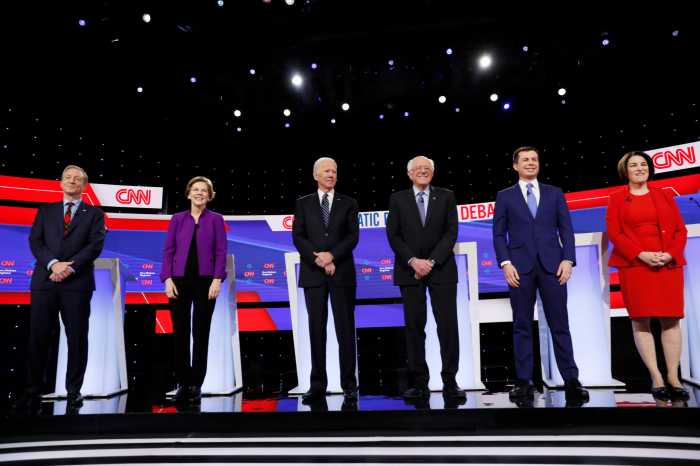BY PAUL SCHINDLER | If the biggest LGBT rights wins have been ending the Don’t Ask, Don’t Tell military policy, overturning the federal Defense of Marriage Act, and winning marriage equality nationwide, an uncomfortable truth for candidate Hillary Clinton is that the first two were reversals of policies signed into law by her husband. Vermont Senator Bernie Sanders, waging a surprisingly robust challenge from the left, reminds crowds that he was one of only 67 “no” votes on DOMA in the 435-member House of Representatives.
Some Hillary boosters argue — not unreasonably — that DOMA and Don’t Ask, Don’t Tell are both very old history, especially when evaluating a candidate who today embraces major LGBT political goals with gusto. But history is history and facts are stubborn things. What’s important to me about all this is how Clinton reckons with that past, allowing us a window on the candor she’ll bring to the ongoing fight for equality. Recent comments from Clinton give reason for pause.
First the history. In his 1992 campaign, Bill Clinton promised to end the ban on gay and lesbian military service. When faced, in his administration’s earliest days, with adamant opposition from the Joint Chiefs of Staff and members of Congress, including prominent Democrats, however, he backed down and accepted a cynical “compromise,” which led to nearly two more decades of harassment and discharge.
In 1996, as progress toward marriage equality in Hawaii stirred concern on the right, veto-proof majorities in both houses of Congress coalesced in support of DOMA. Clinton, arguing he opposed both discrimination and marriage equality, accused the Republicans of creating a wedge issue but announced he would sign the bill. His supporters insisted to do otherwise would threaten his reelection, despite GOP adversary Bob Dole’s anemic poll standing. With reelection assured by late October — and perhaps with an eye toward a 50-state sweep — the president took to small Christian radio stations in red states to brag about how he defended traditional marriage.
That last is a particularly problematic action to defend, though when Hillary spoke to MSNBC’s Rachel Maddow on October 23, the Christian radio chest-thumping did not come up. Clinton did, however, offer a defense of her husband’s reason for signing DOMA simply not supported by the facts: “On Defense of Marriage, I think what my husband believed — and there was certainly evidence to support it — is that there was enough political momentum to amend the Constitution of the United States of America, and that there had to be some way to stop that.” In other words, DOMA was that firewall. When Maddow suggested that Clinton was arguing the law was a “defensive action,” Hillary embraced that language, going so far as to apply the same explanation for Don’t Ask, Don’t Tell.
The problem is that the constitutional amendment threat was not in the air in 1996; that wouldn’t pop up for nearly two more presidential terms, becoming a signature issue in George W. Bush’s 2004 reelection campaign. I know this from my own reporting. Freedom to Marry’s Evan Wolfson knows this because nobody knows the history of marriage equality better than he does. And Elizabeth Birch, a Hillary partisan who was in charge of the Human Rights Campaign in 1996, knows it.
As for Don’t Ask, Don’t Tell being defensive, that’s simply a cover for one of the most ineptly handled political initiatives of the Bill Clinton years.
Hillary disavowed Don’t Ask, Don’t Tell in 1999, while her husband was still in office. She was much slower to evolve on DOMA and marriage equality — telling me, in 2000, that limiting marriage to different-sex couples is justified by “historic, religious, and moral content that goes back to the beginning of time.”
In the Senate, however, she did fight efforts at a constitutional amendment; at the State Department, she racked up a stellar record in articulating a view and a policy equating gay rights with human rights; and, today, she is a staunch advocate of the Equality Act and a critic of those who hide behind religious exemption claims to deny LGBT Americans equality.
Taking the right positions, however, is just half the battle. The LGBT community needs to know that a President Hillary Clinton will fight to deliver on her commitments. If we are to gain that confidence, we need to know first and foremost that she will always level with us. In looking back at the history of her husband’s record on LGBT rights, right now Hillary is simply not doing that.




































